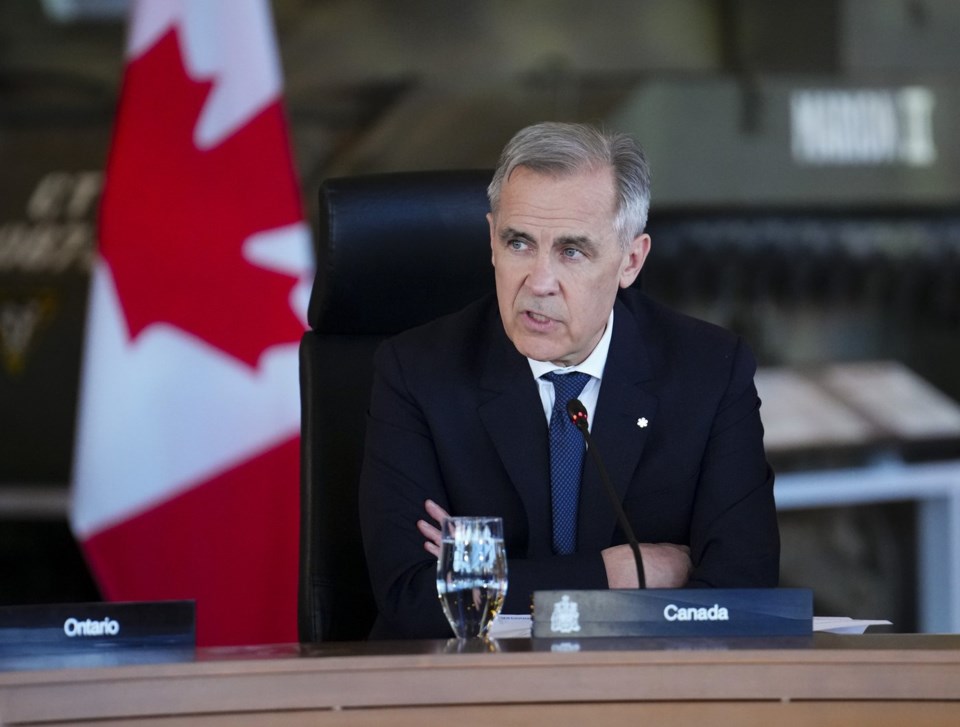OTTAWA — Canada's premiers are heading into a meeting with Prime Minister Mark Carney in Saskatoon Monday armed with their wish lists for major "nation-building" projects that could buttress the economy in the face of a U.S. trade war.
Carney asked the premiers to each pass on five suggestions for national infrastructure projects, and Monday's meeting will aim to identify the ones that will make the final cut to be fast tracked using legislation Ottawa may introduce as early as this week.
The conversation is taking place against the backdrop of an ongoing trade war with the United States, renewed debate about separatism in Alberta and a push to break down interprovincial trade barriers to encourage more trade between provinces and less reliance on trade with the U.S.
That push already had a sense of urgency, following several months of unpredictable tariff moves by President Donald Trump, but got another injection of reality on Friday, as Trump indicated plans to double already damaging tariffs on steel and aluminum from 25 per cent to 50 per cent on June 4.
Canada-U.S. Trade Minister Dominic LeBlanc said in a statement Saturday that Ottawa has "taken note" of that new plan and remains "resolute" to defend Canadian workers and communities.
"We can give ourselves far more than the United States can take from us," he said on X. "That’s why this Monday, the prime minister will meet with premiers in Saskatoon with one goal — build one Canadian economy out of thirteen, and get big, nation-building projects built faster."
The federal government is developing what it calls a "national interest" bill to fast-track a small number of nation-building projects with a streamlined regulatory approval process as a substitute for reviews under the Impact Assessment Act.
Which projects are the main topic of debate on Monday, with a heavy emphasis on critical minerals mining, energy and ports.
Ontario Premier Doug Ford said Friday his priority is mining in the "Ring of Fire," a region about 500 kilometres north of Thunder Bay, Ont., that contains massive deposits of critical minerals. Another priority is building a new nuclear plant in the province.
Ford said he believes Carney will pick a few priorities across the country that would have a major impact.
"One has to be the pipelines," Ford said, adding Canada can't "be relying on the U.S. any longer" as its primary energy customer.
Ford said he believes Carney wants to work collaboratively with the provinces and that Saskatchewan Premier Scott Moe told him Friday morning he's excited to host the event.
"I think a priority is to bring the whole country together," Ford said. "The previous government and previous prime minister didn't show enough love, in my opinion, to Alberta and Saskatchewan. We have to be a united country."
Moe offered to host the meeting when he spoke with Carney soon after the federal election. Moe said in a social media in May that this will be the first meeting between the prime minister and the premiers held in his province in 40 years.
The gathering comes as both Saskatchewan and Manitoba have declared provincewide states of emergency as wildfires threaten communities in remote northern regions. In Manitoba, 17,000 residents have been forced from their homes in recent days, while more than 4,000 people in Saskatchewan have had to evacuate.
In a mid-May letter to Carney, Moe pitched 10 policy changes he said the federal government should make to reset Ottawa’s relationship with Saskatchewan.
His requests include starting negotiations with China to remove its tariffs on Canadian agri-food products, repealing the oil and gas emissions cap, expanding pipeline capacity and building trade and economic corridors across the country.
"Your government has the ability to move forward on all 10 of these items quickly, which would clearly signal a new, more positive relationship between Saskatchewan and the federal government than we have had for the past 10 years," the letter said.
In May, New Brunswick Premier Susan Holt shared on social media her province's priorities for nation-building projects, including critical mineral projects that are ready to move now.
She said New Brunswick ports are "ready to increase national and international trade with additional investments" and that the province is a leader in modular home building, ready to "tap into investments to tackle the national housing crisis."
Manitoba Premier Wab Kinew also sent Carney a letter in May pitching federal-provincial partnership on several projects, including a trade corridor through the Port of Churchill, establishing Indigenous "fair trade zones" and developing critical minerals infrastructure. In his letter, Kinew called his province "the Costco of critical minerals."
Alberta Premier Danielle Smith's office declined to provide a statement ahead of the meeting, saying the premier has made her priorities for the federal government clear in recent weeks.
British Columbia will be represented at the meeting by deputy premier Niki Sharma, as Premier David Eby left Saturday for a 10-day trade trip to Asia. Eby’s office said he booked his trade diversification mission trip to Japan, South Korea and Malaysia before the first ministers meeting was scheduled, and virtual attendance isn't possible because of the time difference.
A May 1 letter from Eby to Carney cited four "priority areas" he said require closer partnership between B.C. and Ottawa: the ongoing softwood lumber dispute, efforts to streamline rail and trade corridors, clean energy and critical mineral projects, and housing affordability and homelessness.
— With files from Jack Farrell in Edmonton, Allison Jones in Toronto and Wolfgang Depner in Victoria
This report by The Canadian Press was first published June 1, 2025.
Catherine Morrison, The Canadian Press



